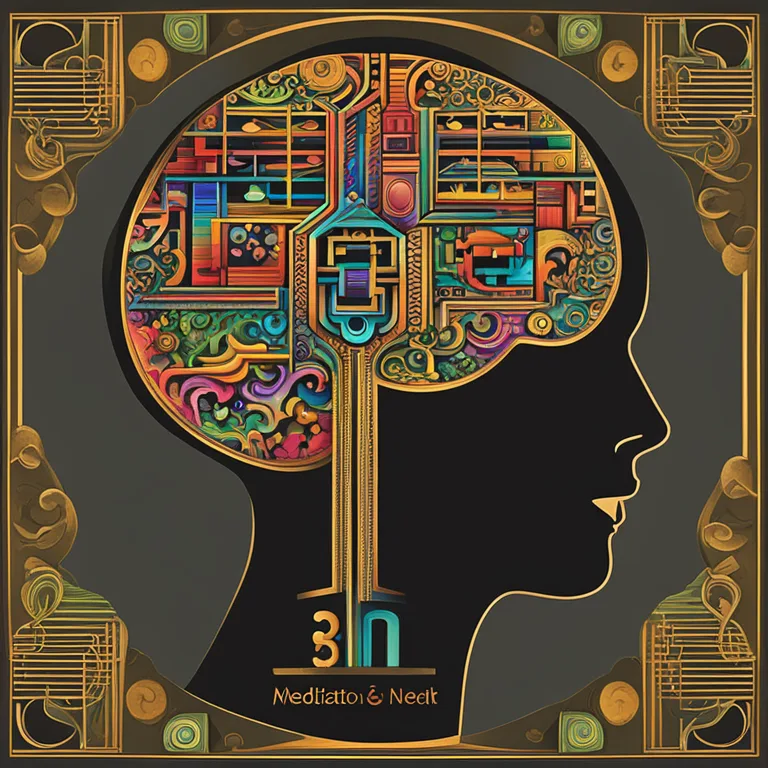
Meditation's Impact on the Limbic System
Explore how meditation can positively influence your emotional and neurological well-being through its effects on the limbic system.
article by Hina Kurosawa
Meditation: A Brain Balancing Act
Meditation has been practiced for thousands of years, yet its benefits continue to remain relevant, particularly with the advancements in neuroscience. As we push into 2024, the understanding of how meditation affects the limbic system, our emotional center, has deepened. This practice that once seemed purely spiritual has now gained recognition for its tangible, neurological virtues. Meditation is not just a fleeting trend but a vital tool for emotional regulation and cognitive health. By engaging in regular meditation, individuals can nurture their mental landscape, fostering an environment for healing, resilience, and growth.

The Limbic System: An Emotional Epicenter
The limbic system is often referred to as the brain's emotional hub, orchestrating a symphony of feelings, memories, and arousal states. This complex network of structures includes the hippocampus, amygdala, and hypothalamus, among others, playing a pivotal role in our emotional life and memory formation. It is responsive to stress and is involved in the processing of both pleasure and pain. In an era where stress is rampant, influencing the limbic system through meditative practices presents an opportunity for individuals to achieve a more harmonious internal state.

The Calming Influence of Meditation
Meditative practices exert a soothing influence on the limbic system. They promote relaxation and enable the mind to transition from a state of heightened alertness to one of calm. Studies from recent years indicate that meditation can downregulate the activity of the amygdala, the region associated with processing fear and anxiety. Furthermore, it can enhance the connectivity between the amygdala and prefrontal cortex, bolstering one's ability to manage responses to stress. These changes not only impact our short-term mood but can also have long-term benefits for emotional resilience.

Developing Emotional Awareness and Control
One of the most compelling effects of meditation on the limbic system is the cultivation of emotional awareness and self-regulation. Through practices such as mindfulness meditation, individuals learn to observe their emotions without getting entangled in them. This enhanced insight paves the way for greater emotional intelligence and control. With consistent practice, meditation can help to stabilize mood swings and contribute to a more balanced emotional life, crafting a path toward enhanced mental well-being and a richer, more composed life experience.
Meditation and Memory
Aside from managing emotions, meditation has been linked to improved memory and learning—functions attributed to the hippocampus within the limbic system. By fostering a state of relaxed focus, meditation enables better cognitive processing and memory consolidation. Several studies suggest that those who meditate regularly tend to have a more pronounced hippocampal volume. This is particularly relevant as we face an aging population increasingly affected by cognitive decline and neurodegenerative diseases.
Embarking on the Meditative Journey
As we foresee the future and the continued advancements in neurotechnology, meditation offers a timeless and accessible way to positively shape our brain's architecture. The practice doesn't require any special equipment or advanced technology—just a willingness to allocate a few minutes daily to mindfully engage with one's inner self. The journey into meditation for the betterment of the limbic system starts with small, consistent steps. By regularly engaging with this transformative practice, you pave the way toward enhanced emotional health and overall well-being.
Published: 1/8/2024
Modified: 1/8/2024
More predictions
Come back here soon to learn more about yourself and your future


Mastering Meditation: Pathways to Inner Peace
Discover the transformative benefits of meditation techniques, offering a gateway to enhanced well-being and mindfulness in the modern era.


Meditation Basics: Tips for Inner Peace and Focus
Discover practical meditation tips and techniques to foster inner peace and enhance focus in your daily life.


Rare Meditation Practices for Mindful Discovery
Delve into the realm of rare meditation practices that offer unique pathways to tranquility and self-awareness.